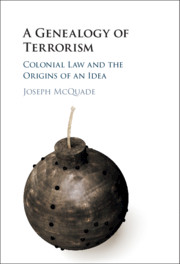Book contents
- A Genealogy of Terrorism
- A Genealogy of Terrorism
- Copyright page
- Dedication
- Epigraph
- Contents
- Figures
- Acknowledgements
- Abbreviations
- Introduction
- 1 Ethereal Assassins
- 2 ‘The Magical Lore of Bengal’
- 3 ‘The Eye of Government Is on Them’
- 4 Indefinite Emergency
- 5 Terrorism as a ‘World Crime’
- Conclusion
- Glossary
- Select Bibliography
- Index
Conclusion
Empire, Law, and Terrorism in the 21st Century
Published online by Cambridge University Press: 30 October 2020
- A Genealogy of Terrorism
- A Genealogy of Terrorism
- Copyright page
- Dedication
- Epigraph
- Contents
- Figures
- Acknowledgements
- Abbreviations
- Introduction
- 1 Ethereal Assassins
- 2 ‘The Magical Lore of Bengal’
- 3 ‘The Eye of Government Is on Them’
- 4 Indefinite Emergency
- 5 Terrorism as a ‘World Crime’
- Conclusion
- Glossary
- Select Bibliography
- Index
Summary
While the exceptional legal measures adopted by the colonial state to suppress ‘terrorist’ attacks in the 1920s and 1930s attracted the sustained criticism of India’s mainstream nationalist politicians, these measures did not disappear when the country gained independence at the stroke of midnight on 15 August 1947. To the contrary, the spectre of ‘terrorism’ would haunt the independent nation-states of India and Pakistan – and later Bangladesh – for the next seventy years and beyond. While the postcolonial states of South Asia finally returned sovereignty to the people of the subcontinent, many of the legal and bureaucratic structures that had provided a framework for colonial rule remained in place. These included various extraordinary laws that targeted terrorism, sedition, and armed insurgency. Born out of the brutal violence of partition, in which hundreds of thousands died and millions were displaced in communal clashes between Hindus, Muslims, and Sikhs, both India and Pakistan emerged at a time of bloody crisis.
- Type
- Chapter
- Information
- A Genealogy of TerrorismColonial Law and the Origins of an Idea, pp. 240 - 248Publisher: Cambridge University PressPrint publication year: 2020

